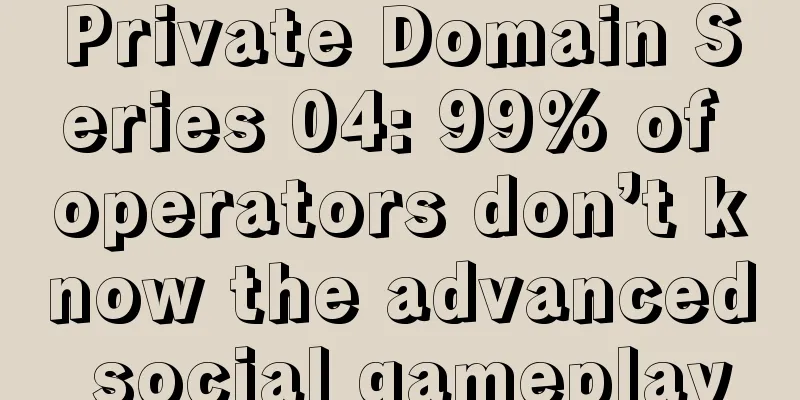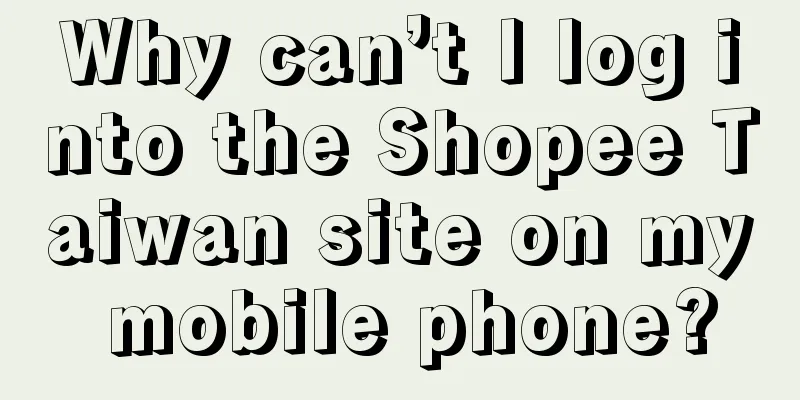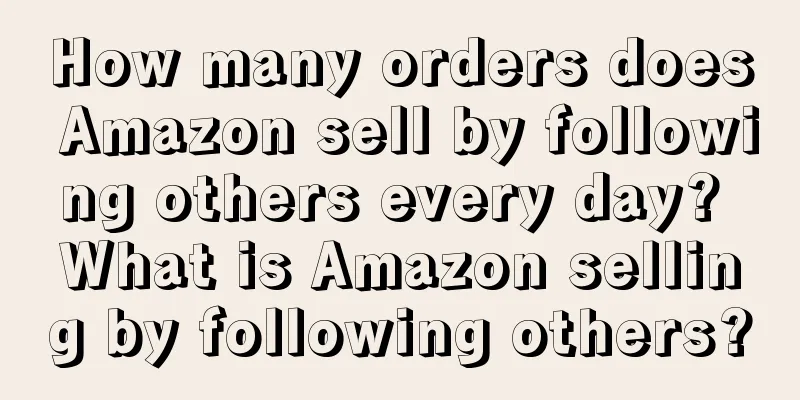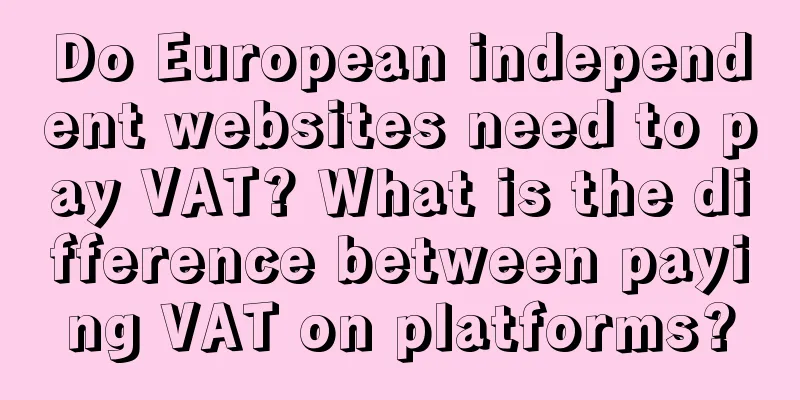Private Domain Series 04: 99% of operators don’t know the advanced social gameplay

1. 99% of operators don’t know about advanced social media gameplayHave you ever seen a group that does not require any operations to make sales, but users instead urge you to collect money? Have you ever seen a group that is operating quite lively, but once you start to convert sales, the group members turn a deaf ear and refuse to pay! They are all community operators, so why is there such a big difference in their conduct? Let me share an advanced community gameplay that I have kept privately for many years. Using this method, the renewal rate of one of our company’s groups has been above 90% all year round. Yes, it’s the kind where users keep urging us to pay! Remember! There are three points that cause this gap, especially the third point, which subverts common sense. For easy understanding, I will use three words to simply summarize it! The first word: systemThere cannot be just one type of community, but a community system should be established for different users. The simplest is a four-level community system: new user group, old user group, paying user group, and loyal fan group. New user group: light operation, used to let new users who have just joined our community know who we are, what products we have, and what benefits we can bring to them. Remember to disband in time! Old user group: Moderate operation, serving old users, and continuously outputting value, with the aim of gaining their trust and generating sales. Paying user group: Users who are heavily operated and can pay are all true fans. Do a good job of delivering value, and they are the group you should pay the most attention to. Loyal fan group: heavily operated, core paying users, true love among true love, it is this small group of people who will chase you for money! The second word: siegeBuilding a community system is only the first step. You have to artificially create a siege effect, let the lower-level communities envy the higher-level communities, and form an envy chain between communities. For example, the new user group would envy being able to join the old user group, because the old user group must have exclusive rights and services, such as live broadcast sharing by big names, private topic discussions, exclusive information for old users, etc. When new users envy old users, old users envy paying users, and paying users envy being able to join the loyal fan group, the siege effect is created. The third word is a bit counterintuitive: screeningAre good groups created through operations? After years of practical experience and leading operations teams, I have discovered that good communities are mutually beneficial. They require not only superb operational capabilities, but also good users. However, what we often lack are good users. A good community is not created by high probability operation, but by screening! The Internet has no shortage of traffic, nor of junk traffic. What it lacks are users who are willing to communicate, learn and pay. What we need to do is to set a standard to screen and find those good users. After finding them, we let them know our value, let them pay, and then gather them in a group, let them interact and communicate, and use them to help us influence more other users. To summarize the advanced community gameplay in three words: system, siege, and screening. 2. Let’s talk about different groups in one sentenceTraffic generation group: The key to community operation based on traffic growth is the accumulation of potential energy, which is consumed in exchange for the number of users. New user group: First meeting, let’s make friends! Training camp community: continuous value delivery and breaking through the trust threshold. Delivery-oriented community: Deliver experience beyond expectations and increase LTV. Loyal fan group: deep connection and circle building. Localized communities: create expectations online and facilitate face-to-face meetings offline. 2B (big customer) community: display professionalism, build goodwill, and gain demand. 3. Most people get the first step wrongCome on, friends, let me ask you a heart-wrenching question: What is the first step in community operation? You can stop for 3 seconds and think of an answer before reading on. This is a magical question. I often use it to challenge interviewees. This question can test whether the person sitting opposite you is a gorgeous theorist or a simple practitioner! This society likes "hard work to make miracles happen" too much, especially those bosses who don't understand operations. They often tell operations to ignore 3721 and create a hundred groups for them. They will definitely be able to operate a few decent groups. What are you thinking about? Boss, if you don't understand, take a break first. Let me tell you a number that is a bit counterintuitive. In a very active and lively community of 500 people, how many people do you think speak more than 10 sentences a day? No more than 20 people! What do you mean? There are more than 400 people who are just runners-up. That’s okay. It does not affect the existence of a highly active community at all. Not everyone wants to be an actor, and actors also need the support of the audience! Therefore, the first step in community operation is to operate a small group, and the first step in small group operation is to find the core users of no more than 20 people! How to find core users? If you already have a group of 500 people, you can use the elimination method. If you can only keep 50 people from this group, which 50 people are they? If you can only keep 20 people, which 20 people are they? Isn’t it clear in an instant? If you are preparing to build a group, congratulations, it's not too late. First, find those people who often like, leave messages, interact with you and recognize your products in private, and have a one-on-one private chat with them. It is not difficult to find 20 people. So the question is, what is the second step of community operation? 4. 7 things to do after you have a groupAs long as you set up a group and prepare to operate it, you must do these 7 things well, not even one less! First: establish a program. You need to tell group members why we are gathered in a group, what purpose our group can achieve, and what values our group advocates. Abstract things are very important, and everyone needs a reason! Second: establish group rules. The country has its laws, and the group has its rules. This group is mine, and you must abide by the rules I set. This group belongs to everyone, and each of us should abide by this common agreement! Third: breaking the ice. When you first join a group, everyone is a stranger. At this time, an interesting and lively ice-breaking self-introduction is particularly important. The experience of ice-breaking activities largely determines whether a group is active. I have prepared 20 community ice-breaking games for you. I have tested them and they are easy to use. Friends in need, please like the video first and then leave a message! Fourth: Gather people. The interaction between group members cannot be random chatting. We need to guide users’ discussion around our products, deliver content, answer questions and gather people. Fifth: Strong interaction. One criterion for measuring the quality of community operations is the number of interactive links between communities. We not only allow group members to interact with group owners, but also allow group members to interact with each other, not only online but also offline if conditions permit! Sixth: Create celebrities. A community is actually a small ecosystem, and creating celebrities is about building a community circle. We need to find those community users who are active, willing to share, and enthusiastic about interacting, and help them become community KOLs, so that they can influence community users who like to lurk. Seventh: Create momentum. The ultimate goal of community operation is conversion. We must continuously output content, value and attitude to continuously accumulate potential. Once the potential is high enough to break through the trust threshold, sales will naturally occur! 5. What exactly is the community operating?Have you ever wondered why a group is active or inactive? Have you ever wondered why some people would pay for a group while most people would not? Have you ever thought about this: we talk about community operation and community operation every day, but what exactly are we operating? I will reveal the secret to you right away. If you really understand the following content, the above problems will be easily solved! Let me tell you a rule that you know but have never thought about seriously: we only trust people we are familiar with and will only pay those who can provide us with value! Therefore, operations experts all know that a very important underlying core of community operations is: social relationships. Through community operations, they will help users quickly transform from unfamiliar new users to familiar old users, and then through value and content delivery, they will make users trust us and ultimately pay us. One of the core functions of community operation is to accelerate the social relationship between us and users! Through community operation, users who originally needed half a year to pay can now pay in just one month. Then the question is, how to quickly improve social relationships through community operations? Learn the following two points, and you can get an operations position with a monthly salary of 20,000 in minutes! First, increase the number of social links. Social links are the interactive relationships between community users, and there is a link between every two people. A good community is not only about the interaction between the group owner and group members, but more about the interaction between group members. The more such interactive relationships, the better the group social relationship! Therefore, a good group is not only for the group owner, but also for everyone in the group! Community experts will create various opportunities for group members to interact and communicate with each other to build a community circle. The second point is to enhance the depth of community connections. A good ice-breaking plan, a deep and resonant topic discussion, or even a rescue of a community crisis will deepen the depth of community connections. Let me leave you a tail. Did you know that there is a very simple and immediate way to enhance the depth of your community? |
<<: Community Operation SOP Strategy
Recommend
What are the requirements for Shopee merchants to join? How many hard standards are there?
Shopee's trend is very good, so merchants are ...
Is it necessary to pay a deposit for Shopee activities? Detailed analysis
Most e-commerce platforms require merchants to pay...
How does shein toys become a hit? Hot sale analysis method
As a fashion e-commerce platform, Shein not only s...
Five new “authentic flavors”! How does Lay’s decode local culture?
This article delves into how Lay's decodes Chi...
Do Amazon FBA shipments require customs declaration? How to declare customs?
Now when people open a store on Amazon, they gener...
What is Amazon Europe VAT? In what situations do you need to register?
Nowadays, when doing cross-border e-commerce, you ...
How can Shopee e-commerce achieve sales? How can Shopee increase sales?
To do Shopee e-commerce, merchants must first sele...
Introduction to the free traffic channel activity for slow-selling products on Pinduoduo’s homepage
Pinduoduo products have been in the homepage pool ...
Xiaohongshu replaces "Zhang Xiaohui" with store broadcast
Can the store broadcast strategy help to gain a he...
The March marketing calendar is here, so Chunri Marketing will seize the opportunity by doing this!
March is coming soon! What are the hot spots in Ma...
How to set up automatic bidding on eBay? What are the bidding rules?
eBay has two product pricing modes: fixed price an...
Always maintain critical ignorance
Nowadays, the information on the Internet is compl...
Duan Yongping and Jiang Xiaobai: Who understands marketing better?
There are a lot of invisible marketing now, and ma...
In the Paris Olympics marketing, did Yili succeed in “ambushing” Mengniu?
When sportsmanship meets business wisdom, a market...
What are the prospects of learning cross-border e-commerce? Is it easy to do?
Everyone also realizes that it is not so easy to r...









